Can Technology Undermine Our Happiness?

In the contemporary, high-speed society, technology has seamlessly integrated into our daily existence. We rely on it for almost everything—connecting with friends, managing our schedules, acquiring knowledge, and even seeking emotional support. The role technology plays is undeniably vast, permeating various aspects of our daily existence. However, this convenience and ubiquity come with an underlying question: Can technology undermine our happiness?
In this article, we'll delve into the complex relationship between technology and our emotional well-being. We'll look at how technology has presented us with both Problems and Choices that affect our happiness quotient.
The Glorious Promises of Technology
Convenience and Connectivity
Technology offers unprecedented convenience. It helps us communicate in real-time with people halfway across the globe, do our shopping without leaving the comfort of our homes, and access a universe of information with a few taps on our screens. These advancements can undeniably contribute to an improved quality of life.
The Expansion of Choices
One of the most incredible things technology offers us is the vast array of Choices. From what we eat, where we go, and how we entertain ourselves, technology opens up a world of possibilities. We can order any cuisine, listen to any music, and watch any show, all customized to our individual tastes.
The Hidden Problems: A Double-Edged Sword
However, technology also brings with it a set of Problems that are not always visible on the surface.
The Paradox of Choice
As psychologist Barry Schwartz famously argued, having too many Choices can lead to anxiety and paralysis, rather than freedom and happiness. The overwhelming amount of options can lead us to question our decisions, trigger FOMO (Fear of Missing Out), and ultimately make us less satisfied with the choices we do make.
Social Comparison and Online Persona
The technological landscape, particularly social media, allows us to construct idealized versions of our lives. But the constant exposure to such 'perfect' lives can lead to unhealthy social comparisons, resulting in lower self-esteem and higher stress levels. In a way, our online personas can become a yardstick against which we unfairly measure our real lives.
Information Overload
We find ourselves in an era marked by an information explosion. While technology gives us access to endless information, filtering and processing this information can become exhausting. This information overload can lead to stress and cognitive fatigue, affecting our ability to make rational decisions and thereby undermining our happiness.
The Choices We Make: User or Used?
Understanding the problems doesn't necessarily mean we have to disconnect from technology. Instead, it encourages us to be more discerning about the Choices we make when engaging with technology.
Mindful Consumption
Just like we strive to consume food that nourishes our bodies, we should aim to consume technology that nourishes our minds. This means being selective about what we expose ourselves to and setting boundaries for healthier interactions.
Digital Detox
Taking short breaks from technology, also known as a digital detox, can be incredibly beneficial. It helps us regain focus, lower stress levels, and improves our overall emotional well-being.
Prioritize Real Connections
While technology can facilitate connections, it can never replace the emotional depth achieved through face-to-face interactions. Prioritizing real connections over virtual ones can significantly improve our happiness quotient.
The Role of Big Tech: Freedom vs. Control
In discussing the impact of technology on our happiness, we cannot overlook the role played by big technology companies. These corporations wield an enormous amount of influence over our Choices, nudging us in directions that serve their business models rather than our well-being.
The Algorithmic Trap
Most social media platforms utilize sophisticated algorithms to curate the content we see. While this customization can provide us with relevant and engaging content, it also traps us in what's known as a "filter bubble." In this bubble, we are exposed only to perspectives and information that align with our existing views. This lack of diversity can not only stifle personal growth but can also contribute to a more polarized society.
Surveillance Capitalism
Big Tech companies often offer "free" services in exchange for data. This data is then used to build detailed profiles of users, which are monetized through targeted advertising. While this might seem like a fair trade-off, the Problems arise when this data is used to manipulate user behavior subtly. Such manipulation can have far-reaching consequences, affecting everything from our purchasing decisions to our political views, and by extension, our happiness.
The Ethics of Design
Many technology platforms are designed to be as addictive as possible. Features like infinite scrolling and "pull-to-refresh" mechanisms are based on principles of behavioral psychology to keep users engaged. This leads to compulsive usage patterns, which can have detrimental effects on our mental health.
Individual Responsibility and Collective Action
While the onus of making healthier Choices lies with us, collective action is also crucial in ensuring that technology serves humanity's best interests.
Advocacy and Regulation
Awareness is the first step towards change. Grassroots advocacy can put pressure on governments to regulate Big Tech and ensure that these corporations are held accountable for their actions. In some countries, laws are being enacted to protect user data and curb monopolistic practices, but much more needs to be done.
Digital Literacy
Educating ourselves and others about the potential pitfalls of technology is essential. Understanding how algorithms work, knowing how to protect our data, and learning to recognize manipulative design features can go a long way in mitigating the negative impacts of technology on our happiness.
Looking Ahead: The Future of Technology and Happiness
As technology continues to evolve, its impact on our lives will only grow. Upcoming technologies like virtual reality, artificial intelligence, and the Internet of Things (IoT) will present new challenges and opportunities for our well-being.
Embracing the Positive
It's crucial to remember that technology can also be a force for good. Telemedicine, online education, and virtual communities can offer enormous benefits, especially for those who might otherwise be isolated or underserved.
Setting Boundaries
As technology becomes increasingly integrated into our lives, setting boundaries will become even more critical. Knowing when to unplug, how to manage our online interactions, and being mindful of our digital consumption patterns will help us navigate the future landscape.
The Erosion of Attention and Focus
As we delve deeper into the subject, it's essential to address the topic of attention and focus. Our ability to concentrate plays a pivotal role in our well-being, but technology, for all its benefits, can be a significant distraction.
The Notification Economy
Our devices are engineered to grab our attention. Push notifications, breaking news alerts, and real-time updates prompt us to break our focus continually. This constant interruption leads to fragmented attention, affecting our ability to engage deeply with tasks or even with the people around us.
Mind-Wandering vs. Mindfulness
The scattered focus enabled by our devices contrasts sharply with the concept of mindfulness, a state of being fully present in the moment. Research indicates that mindfulness can contribute significantly to our happiness. Unfortunately, the very design of many technologies pulls us away from this state, encouraging mind-wandering and diminishing our happiness in the process.
The Illusion of Multitasking
Another point to consider is the fallacy of multitasking. Many of us consider the ability to juggle multiple tasks simultaneously as a skill, especially in our tech-savvy world.
Cognitive Costs
However, evidence suggests that multitasking can have cognitive costs. Switching back and forth between tasks can reduce our efficiency and accuracy, leading to higher stress levels and less satisfaction with our work, thereby affecting our overall happiness.
The Importance of Unitasking
The antidote to this is the practice of 'unitasking,' or giving our full attention to one activity at a time. Prioritizing unitasking can be a conscious Choice to counteract the Problems presented by our distraction-prone devices, and it can contribute to a more meaningful and satisfying experience.
Technology and Physical Health
While we have primarily discussed the emotional and psychological aspects, we shouldn't ignore the potential physical Problems that can arise due to excessive use of technology.
Screen Time and Sleep
Increased screen time, especially before bedtime, can disrupt our sleep patterns. Poor sleep not only affects our mood but also has long-term consequences on our health.
Sedentary Lifestyle
The convenience provided by technology often means we are less physically active. A sedentary lifestyle is associated with numerous health issues like obesity, diabetes, and cardiovascular diseases, which can, in turn, affect our emotional well-being.
Ergonomic Issues
Extended periods of device usage can lead to ergonomic issues like carpal tunnel syndrome and back pain. These physical discomforts can further reduce our happiness quotient.
Building Healthy Digital Habits
Taking everything into account, one thing becomes abundantly clear: While technology can pose significant Problems, the Choices we make can offset these challenges.
Time Management Apps
Tools and apps designed to manage screen time or block distracting websites can be incredibly useful. They help us become more aware of our digital habits, thus enabling us to make better Choices.
Technology Sabbaticals
Taking extended breaks from technology, known as technology sabbaticals, can offer valuable perspective on our relationship with our devices. Such periods help us identify triggers and behaviors that undermine our happiness, providing an opportunity to course-correct.
Balance and Awareness
The relationship between technology and happiness is intricate and fraught with complexity. It is neither entirely detrimental nor wholly beneficial. Striking a balance is crucial, and that begins with awareness. Acknowledging the Problems and making conscious Choices can dramatically alter the way technology impacts our happiness.
Our ultimate goal should be to establish a symbiotic relationship with technology—one where we leverage its benefits to enhance our lives while minimizing its potential to undermine our well-being. With thoughtful application and a commitment to self-awareness, technology can indeed be a tool for greater happiness rather than a stumbling block.
Conclusion
Technology isn't inherently good or bad; it is a tool that has the potential to either elevate or undermine our happiness based on how we use it. The key lies in recognizing the Problems and making conscious Choices to mitigate the negative impacts.
As we continue to integrate technology into every aspect of our lives, understanding its psychological and emotional impact becomes increasingly important. By making informed choices, we can navigate the technological landscape in a way that serves our well-being, rather than detracts from it.
So, the next time you reach for your phone, pause for a moment and ask yourself: Is this technology serving me, or am I serving it?


